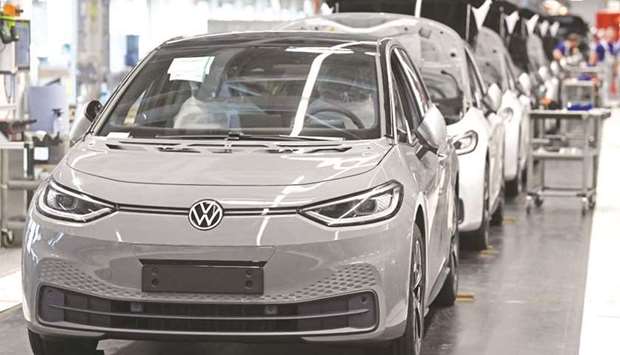Volkswagen is confident that cost cuts will help it raise profit margins in the coming years, the world’s second-largest carmaker said yesterday, a day after outlining an ambitious electric mobility expansion.
“Our good performance in 2020, a year dominated by crisis, will give us momentum for accelerating our transformation,” chief executive Herbert Diess said in a statement.
Asked about the closely-watched issue of a potential listing of luxury division Porsche AG, Diess said there was no need for immediate action given Porsche’s importance to the car maker’s turnaround efforts.
“That’s why you need to think very very hard about every single step,” he said.
Preferred shares in the company rose as much as 6.5% to their highest level since July 13, 2015, giving the carmaker a market valuation of more than €118bn ($141bn). They are up more than a third year-to-date.
Volkswagen aims to more than double deliveries of electric vehicles to 1mn this year, it said, adding it would also apply a standardised platform model introduced for vehicle production years ago to software, batteries and charging.
Diess’ comments come a day after Volkswagen unveiled plans to build half a dozen battery cell plants in Europe and expand infrastructure for charging electric vehicles globally, accelerating efforts to overtake Tesla.
Volkswagen confirmed it aimed for an operating margin of 7%-8% by 2025, adding it would likely end 2021 at the upper end of a 5%-6.5% target corridor.
Stellantis, the world’s fourth-largest carmaker created through the merger of FCA and Peugeot maker PSA in January, is targeting an adjusted operating profit margin of 5.5%-7.5% this year. This will be achieved by lowering fixed costs by €2bn by 2023 compared with 2020, a decline of 5%, as well as a decline of 7% in materials costs over the same period, Volkswagen said.
To get a better handle on personnel costs Volkswagen on Sunday offered early or partial retirement to older employees in a move sources said could cut up to 4,000 jobs at its plants in Germany.
The group employs about 670,000 staff globally.
“We aim to put the ambitious transformation of the Volkswagen Group on a solid financial basis,” incoming finance chief Arno Antlitz said.
The world’s No 2 carmaker, which is in the midst of a major shift towards battery-powered cars, said it plans to have six battery cell production plants operating in Europe by 2030, which it will build alone or with partners. “E-mobility has become core business for us. We are now systematically integrating additional stages in the value chain,” Diess told VW’s Power Day on Monday.
The plants will have a production capacity of 240 gigawatt hours a year, VW said.
“We secure a long-term pole position in the race for the best battery and best customer experience in the age of zero emission mobility,” Diess added.
The group also said it would enter partnerships with oil major BP and top European utilities Enel and Iberdrola to expand electric vehicle charging.
A lack of infrastructure is still seen as a major hurdle to the mass adoption of battery-powered cars.
Volkswagen said it plans to have a new unified prismatic cell design from 2023, which will support cost cuts generated by the raised level of in-house cell production.
“On average, we will drive down the cost of battery systems to significantly below 100 euros ($119) per kilowatt hour,” Volkswagen management board member Thomas Schmall said.
“This will finally make e-mobility affordable and the dominant drive technology.”
The cost of battery cells used for electric vehicles has fallen to an average of $110 per kilowatt hour (kWh), Benchmark Mineral Intelligence (BMI) said in December.

Volkswagen ID.3 electric cars seen at the assembly line at the VW plant in Zwickau, eastern Germany. Volkswagen aims to more than double deliveries of electric vehicles to 1mn this year, the company said.
